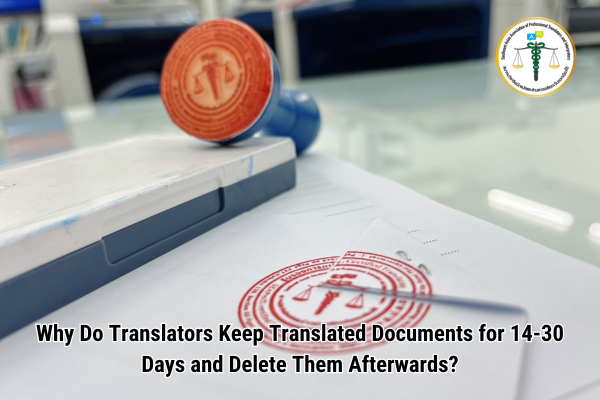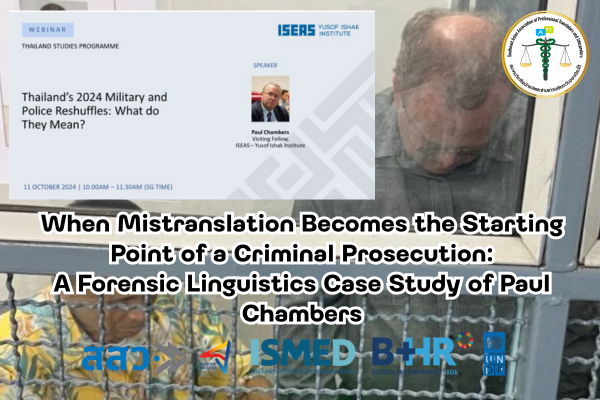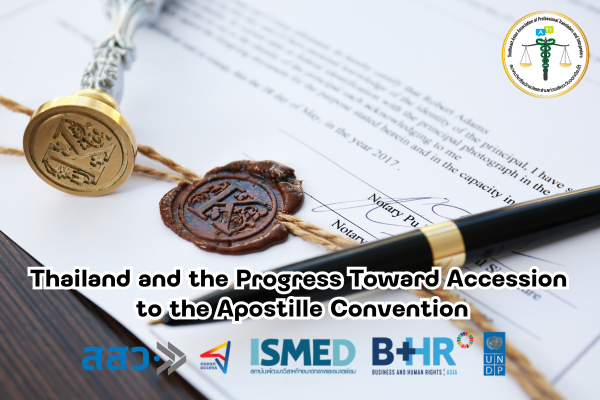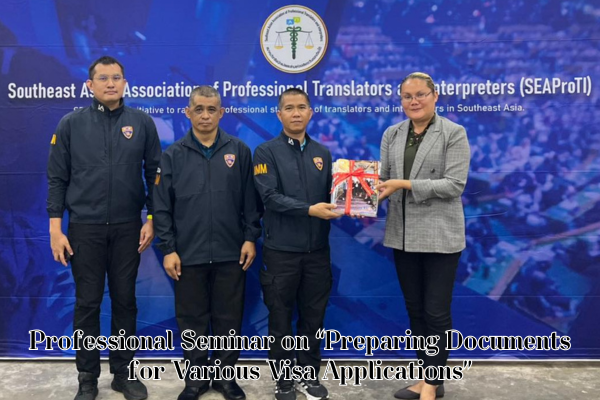Why Do Translators Keep Translated Documents for 14-30 Days and Delete Them Afterwards?
8 February 2025, Bangkok – The practice of retaining translated documents for 14-30 days after delivery, deleting them upon expiration, and charging a new service fee if the client requests a retranslation of the same document later serves several important purposes:
1. Protecting Client Confidentiality and Personal Data
Documents submitted for translation often contain sensitive information, such as legal records, financial transactions, government documents, personal data, or confidential business information.
Deleting these files within 14-30 days helps mitigate the risk of data breaches and ensures compliance with data protection laws (e.g., PDPA in Thailand or GDPR in Europe).
2. Limiting Translator’s Liability
If a translator retains documents indefinitely, they may be held accountable for subsequent changes made to the original document.
For instance, if the original document is modified after translation but the client mistakenly believes it was the translator’s error, this can lead to unnecessary disputes.
By deleting past work, translators avoid undue liability for outdated or altered information.
3. Preventing Misuse of Outdated Documents
Some clients may request previously translated documents for use in a different context, which might no longer be appropriate (e.g., due to legal amendments or contract updates).
By requiring clients to submit a new source document for translation, the translator ensures that the latest version is accurate and relevant.
4. Maintaining Translation Quality & Avoiding Disputes
If a translator keeps old documents for too long, clients might edit the translations themselves and later claim that the translator made errors.
Retranslating ensures that the translator can review the content and maintain quality standards.
5. Adhering to Industry Standards
Professional translation associations, such as ATA and SEAProTI, provide guidelines on the retention period of translated documents to uphold confidentiality and data security.
Many professional translators and agencies include this policy in their Terms of Service to align with industry best practices.
6. Managing Translator’s Resources & Costs
Storing large amounts of old documents requires additional storage space, security measures, and administrative effort.
If a client requests an old translation, the translator must search, retrieve, and review the document, which often takes more time and effort than a fresh translation.
7. Charging a New Fee Because It’s a New Job
Even if the document remains the same, translation conditions may have changed, such as:
Updated service rates
Improved translation techniques
New client specifications
For this reason, translators charge a new fee to reflect the work involved in reviewing or retranslating the document.
Conclusion
Translators keep translated documents for 14–30 days so that clients can retrieve them if needed. After the retention period, translators delete the documents to protect client privacy and limit liability. If clients request translation after this period, it is considered a new job, and standard fees apply. This policy aligns with professional translation standards and benefits both the client and the translator.
SEAProTI’s certified translators, translation certification providers, and certified interpreters:
The Southeast Asian Association of Professional Translators and Interpreters (SEAProTI) has officially announced the criteria and qualifications for individuals to register as “Certified Translators,” “Translation Certification Providers,” and “Certified Interpreters” under the association’s regulations. These guidelines are detailed in Sections 9 and 10 of the Royal Thai Government Gazette, issued by the Secretariat of the Cabinet under the Office of the Prime Minister of the Kingdom of Thailand, dated July 25, 2024, Volume 141, Part 66 Ng, Page 100.
To read the full publication, visit the Royal Thai Government Gazette
ทำไมนักแปลต้องเก็บเอกสารแปลไว้ 14-30 วัน แล้วลบข้อมูลหลังจากนั้น
8 กุมภาพันธ์ 2568, กรุงเทพมหานคร – การกำหนดระยะเวลา 14-30 วัน ในการเก็บรักษาเอกสารแปลหลังส่งมอบ และการลบข้อมูลออกเมื่อครบกำหนด รวมถึงการคิดค่าบริการใหม่หากลูกค้าต้องการแปลเอกสารเดิมอีกครั้ง มีเหตุผลสำคัญหลายประการ ดังนี้:
1. ปกป้องข้อมูลส่วนบุคคลและความลับของลูกค้า
เอกสารที่นักแปลได้รับมักมีข้อมูลสำคัญ เช่น ข้อมูลทางกฎหมาย ธุรกรรมการเงิน เอกสารราชการ ข้อมูลส่วนบุคคล หรือข้อมูลธุรกิจที่เป็นความลับ
การลบข้อมูลภายใน 14-30 วัน ช่วยลดความเสี่ยงในการรั่วไหลของข้อมูล และเป็นไปตามกฎหมายคุ้มครองข้อมูลส่วนบุคคล (เช่น PDPA ในไทย หรือ GDPR ในยุโรป)
2. ลดความรับผิดชอบของนักแปล
หากนักแปลเก็บเอกสารไว้นานโดยไม่มีการควบคุม อาจถูกเรียกร้องให้รับผิดชอบเอกสารที่มีการเปลี่ยนแปลงภายหลัง (เช่น เอกสารต้นฉบับมีการแก้ไข แต่ลูกค้าเข้าใจผิดว่าเป็นความผิดของนักแปล)
เมื่อลบข้อมูลแล้ว นักแปลไม่ต้องรับภาระความรับผิดชอบต่อข้อมูลเก่า
3. ป้องกันการนำเอกสารเก่ามาใช้งานผิดวัตถุประสงค์
บางครั้งลูกค้ากลับมาขอรับเอกสารแปลเดิมเพื่อใช้ในบริบทใหม่ ซึ่งอาจไม่สอดคล้องกับสถานการณ์ปัจจุบัน (เช่น กฎหมายเปลี่ยน หรือเงื่อนไขสัญญาเปลี่ยนไป)
การให้ลูกค้าส่งต้นฉบับใหม่และแปลใหม่ช่วยให้มั่นใจได้ว่าเอกสารแปลถูกต้องและเป็นปัจจุบัน
4. รักษาคุณภาพงานแปล และลดข้อพิพาท
หากเก็บเอกสารไว้นาน มีโอกาสที่ลูกค้าจะนำเอกสารแปลไปแก้ไขเอง แล้วกลับมาโต้แย้งว่านักแปลเป็นผู้ทำผิด
การแปลใหม่ช่วยให้มั่นใจว่านักแปลได้ตรวจสอบและแก้ไขให้เหมาะสมตามมาตรฐานปัจจุบัน
5. เป็นมาตรฐานอุตสาหกรรมการแปลและล่าม
องค์กรวิชาชีพแปลหลายแห่ง เช่น ATA, SEAProTI มีแนวทางในการรักษาเอกสารแปลเป็นระยะเวลาจำกัด และลบข้อมูลเพื่อป้องกันการละเมิดข้อมูล
นักแปลอิสระและบริษัทแปลมืออาชีพมักกำหนดเงื่อนไขนี้ไว้ในสัญญา (Terms of Service)
6. ต้นทุนและทรัพยากรของนักแปล
การเก็บเอกสารเก่าทั้งหมดอาจสร้างภาระในการบริหารข้อมูล เช่น ต้องใช้พื้นที่เก็บข้อมูลมากขึ้น หรือต้องมีระบบรักษาความปลอดภัยเพิ่มเติม
เมื่อลูกค้ากลับมาใช้บริการอีกครั้ง นักแปลต้องเสียเวลาในการค้นหาและตรวจสอบเอกสารเก่า ซึ่งอาจมีต้นทุนสูงกว่าการแปลใหม่
7. คิดค่าใช้จ่ายใหม่เพราะเป็นงานใหม่
แม้ว่าจะเป็นเอกสารฉบับเดียวกัน แต่เงื่อนไขการแปลอาจเปลี่ยนไป เช่น อัตราค่าบริการที่อัปเดต การปรับปรุงรูปแบบการแปล หรือเงื่อนไขของลูกค้าใหม่
นักแปลจึงต้องคิดค่าบริการใหม่ให้เหมาะสมกับเวลาและทรัพยากรที่ใช้ในการแปลเอกสารอีกครั้ง
สรุปส่งท้าย
นักแปลเก็บเอกสารไว้ 14-30 วัน เพื่อให้ลูกค้าสามารถขอรับไฟล์ใหม่ได้ หากเกิดข้อผิดพลาดหรือจำเป็นต้องใช้ซ้ำ หลังครบกำหนด นักแปล ลบข้อมูลออก เพื่อปกป้องความเป็นส่วนตัวของลูกค้าและลดความรับผิดชอบ หากลูกค้ากลับมาขอเอกสารหลังจากช่วงเวลานี้แล้ว นักแปลจะถือว่าเป็น งานใหม่ และคิดค่าบริการใหม่ตามเงื่อนไขปัจจุบัน แนวปฏิบัตินี้เป็นมาตรฐานของนักแปลมืออาชีพ และเป็นประโยชน์ทั้งต่อลูกค้าและนักแปลเอง
เกี่ยวกับนักแปลรับรอง ผู้รับรองการแปล และล่ามรับรองของสมาคมวิชาชีพนักแปลและล่ามแห่งเอเชียตะวันออกเฉียงใต้
สมาคมวิชาชีพนักแปลและล่ามแห่งเอเชียตะวันออกเฉียงใต้ (SEAProTI) ได้ประกาศหลักเกณฑ์และคุณสมบัติผู้ที่ขึ้นทะเบียนเป็น “นักแปลรับรอง (Certified Translators) และผู้รับรองการแปล (Translation Certification Providers) และล่ามรับรอง (Certified Interpreters)” ของสมาคม หมวดที่ 9 และหมวดที่ 10 ในราชกิจจานุเบกษา ของสำนักเลขาธิการคณะรัฐมนตรี ในสำนักนายกรัฐมนตรี แห่งราชอาณาจักรไทย ลงวันที่ 25 ก.ค. 2567 เล่มที่ 141 ตอนที่ 66 ง หน้า 100 อ่านฉบับเต็มได้ที่: นักแปลรับรอง ผู้รับรองการแปล และล่ามรับรอง
























